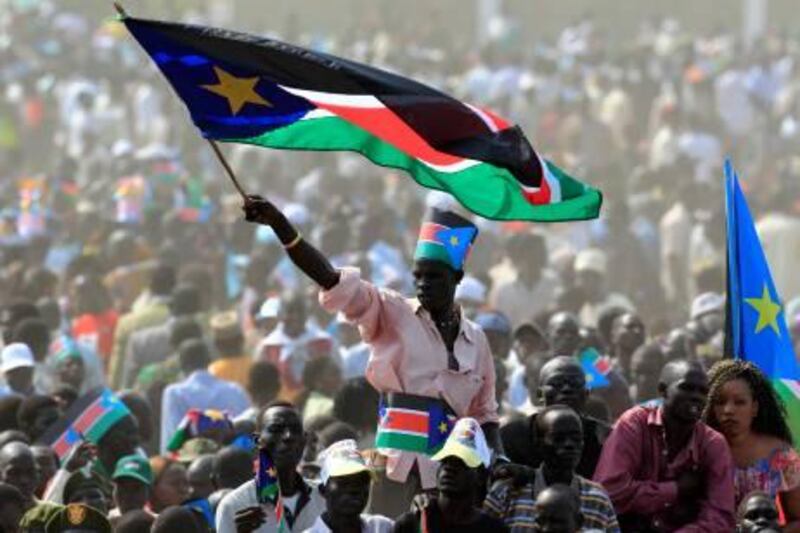JUBA // It was a day so historic that Zelphine Dawa, 42, wanted to record it. Sitting on a plastic chair at Independence Day celebrations in South Sudan yesterday, wearing a cream-colored suit and gold earrings, Ms Dawa took notes in a hard-covered notebook.
"I will put them in my files for my children to see," said the mother of five. Ms Dawa was part of an association of women who brought food to soldiers and visited the wounded in hospital during the country's war of independence.
"I'm going to say to them, today is very important for you, my children, because today we have laid the foundation for your independence," said Ms Dawa, who works in the new country's ministry of gender.
Hundreds of thousands gathered at the memorial for John Garang, the rebel leader who died just months after signing the peace accord, yesterday in Juba as South Sudan declared its independence from the North after a decades-long civil war. Citizens of the new country voted more than 98 percent in favour of separation in a January referendum.
The UN secretary general, Ban Ki-moon, and the US ambassador to the UN, Susan Rice, as well Sudanese President Omar Al Bashir, were among dignitaries in attendance.
"We have waited more than 56 years for this day. It is a dream which has come true," said Salva Kiir, who was sworn in yesterday as the first president of the Republic of South Sudan, which will be the 193rd member of the United Nations. The president signed a copy of the new country's transitional constitution, which was passed last week by its legislative assembly.
More than 2.5 million people died in the civil war in Sudan that the largely Christian and animist South fought against the North to gain its independence. Southerners at the celebration said they had been fighting for the right to choose their own religion and language and freedom from oppression and marginalization.
Peter Atem Nsor, 38, carried a giant wooden cut-out of a hand to independence festivities - a symbol of the South waving good-bye to the rule of the North.
"I'm a first-class citizen now, before [under Northern rule] I was a third-class citizen," he said. The 38-year-old engineer had to go to Ethiopia for his education. "They wouldn't train you [here]. We couldn't get jobs; only the Arabs were in the offices. They didn't respect black men at all."
Besides joy, there was also a sense of relief among many Southern Sudanese, who had feared that a last-minute turn of events would result in the still-birth of their nation.
"In my mind I was worried about it. I was afraid President Bashir would not come because he said this (independence) could never happen. But now I'm free," said Ms Dawa.
Casting shadows over yesterday's celebrations in Juba, however, was the uncertainty of the new country's future. In the past two months, renewed conflict has erupted along the border between the North and South and there has been fear in some quarters about the possibility another war.
Furthermore, "key aspects of the peace process have not yet been completed", said Mr Ki-moon referring to the fact that a referendum that was supposed to be held in the oil-rich state of Abeyi simultaneously with the vote in the South has not taken place. Questions on border demarcation and the sharing of oil revenues between the North and the South also remain unanswered.
"Let this day be a day for the people of the North and South to reaffirm their committment to addressing the unresolved issues of the CPA (Comprehensive Peace Agreement)," said Mr Ki-moon.
The new nation also enters the world with some of the worst development indicators in the globe. Though it covers an area larger than France, South Sudan has less than 50 kilometres of paved road. A woman has a higher chance of dying in childbirth here than anywhere else in the world and four out of five adults cannot read or write.
But diplomats yesterday showed optimism that Southern Sudan can overcome its many challenges.
"The same self-reliance that won your freedom can move you from independence and self-determination to opportunity and democracy," said Ms Rice, the US ambassador. "Few forces on earth are more powerful than a citizenry tempered by struggle and united by sacrifice."
The new country's president assured the world community that South Sudan would exceed expectations.
"Our detractors had already written us off even before the declaration of independence. They say that we will slip in to war even before our flag is hoisted. It is incumbent upon us to prove them wrong," said Mr Kiir.
But before the work of nation building begins, people in Southern Sudanese are stopping to enjoy the unfamiliar feeling of freedom.
As Zelphine Dawa said, "I'm happy because our burden- which was on us since 1983- now is at an end."
foreign.desk@thenational.ae
South Sudan celebrates independence
Hundreds of thousands gather to celebrate creation of nation born out of brutal war.

More from the national




